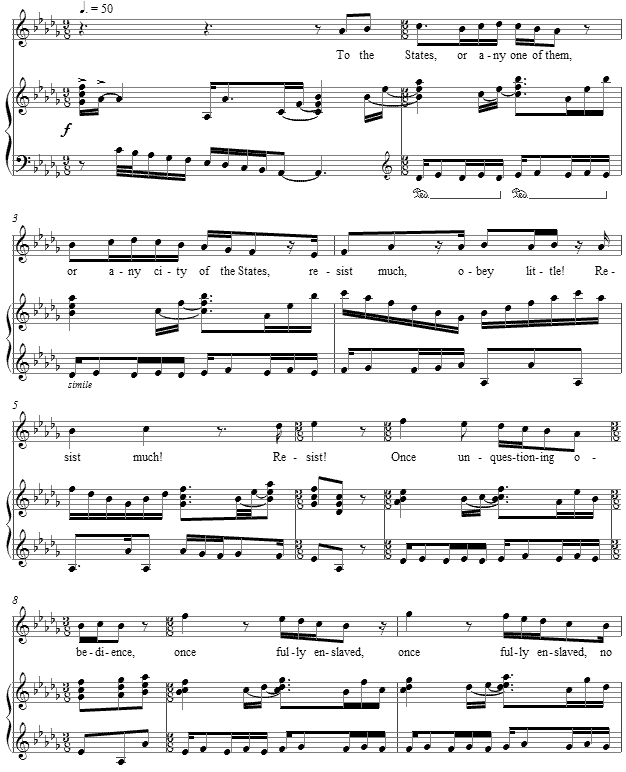Music and Texts of GARY BACHLUND Vocal Music | Piano | Organ | Chamber Music | Orchestral | Articles and Commentary | Poems and Stories | Miscellany | FAQs |
To the States - (2004)
Walt Whitman
from "Inscriptions" in Leaves of Grass
for soprano or tenor and piano
To the States, or any one of them,
or any city of the States,
resist much, obey little!
Resist much! Resist!
Once unquestioning obedience,
once fully enslaved,
no nation, state, city of this earth,
ever afterward resumes its liberty.
Resist! Resist![ 2 pages, circa 50" ]
Walt Whitman
The enthusiasm to be fully political partisan without care for the liberty of others was a concern for Whitman, for he knew, as did men like Chesterton and Orwell and eventually even Shaw, that "unquestioning obedience" to any movement or ideology would eventually result in slavery, of the mind, body and soul.
Let us review and remember the lesson, which seems too often to be forgotten in this seemingly modern era in which, as an answer to racism one race holds another responsible as a group irrespective of individual culpability, rampant feminism equates marital sex with rape, and ideological purity is supposed to trump new and ultimately inescapable facts of human existence. When both major political parties take all their grievances to a federal system growing in power, the states often resist far too little.
What is at stake? Whitman tells us it is liberty which is threatened by "obedience."
tessitura for high voice
I find the enthusiasm for many modern composers towards various incarnations of political correctness and the ideology of socialism to be at odds with their ostensible search for freedom within their own art and craft. To speak with one's own voice is specifically not to speak with another's, a lesson which American poet, E. E. Cummings, also well clarified, though so many more have also advocated "resistance." [ 1 ]
The academic enforcement of ideas such as historical linearity in musical styles and the supposed dominance of twelve-tone theory and set theory as the approved way forward in music has been wrong headed and bureaucratic, at the minimum, and moreover a complete denial of that elusive search for one's "own voice" which these very same academicians pretended to encourage in their students. Musical liberty has always been threatened by "obedience," and the great masters of classical music by the examples of their lives have not been particularly "obedient" to the artistic authority of another. The clear lesson in this is to compose as one sees right, and allow the passage of time rather than mere marketing to be the judge.
tessitura for low voice
The greater lesson, however, is to apply it well beyond the bounds of music and art alone -- rather to the state and world in general.
I also have set of late texts by Whitman is set for soprano and chamber ensemble, entitled, An Echo from the Shore, as well as a choral trilogy for SATB a cappella titled Three Whitman Choruses.
The score for To the States is available as a free PDF download, though any major commercial performance or recording of the work is prohibited without prior arrangement with the composer. Click on the graphic below for this piano-vocal score.
To the States - high To the States - low
NOTES
[ 1 ] See my article on On Government and Art for more on this subject.

